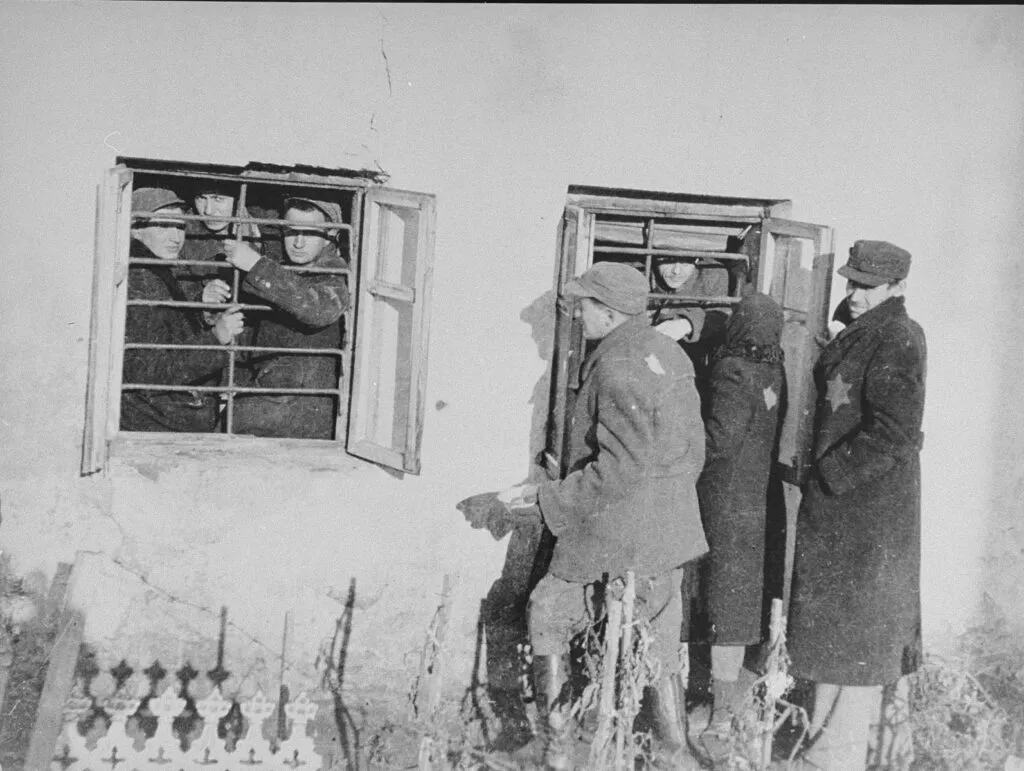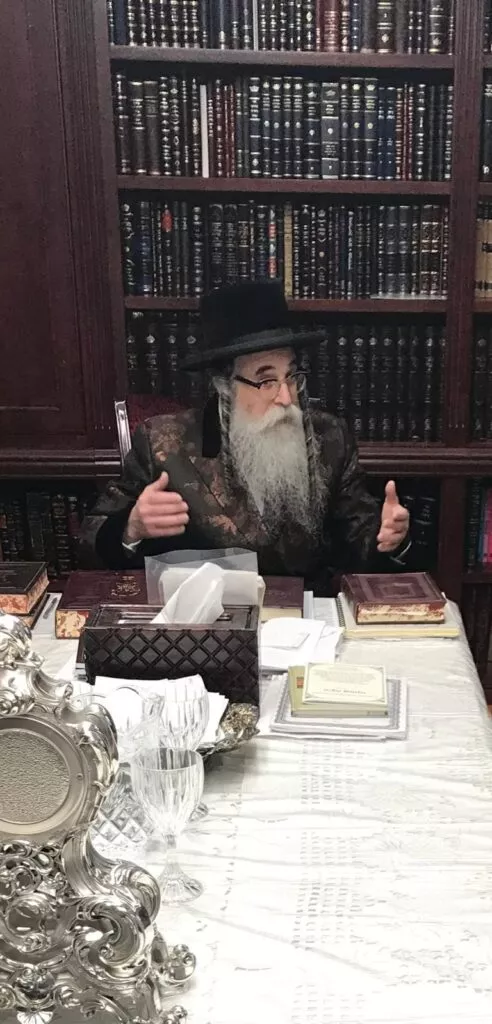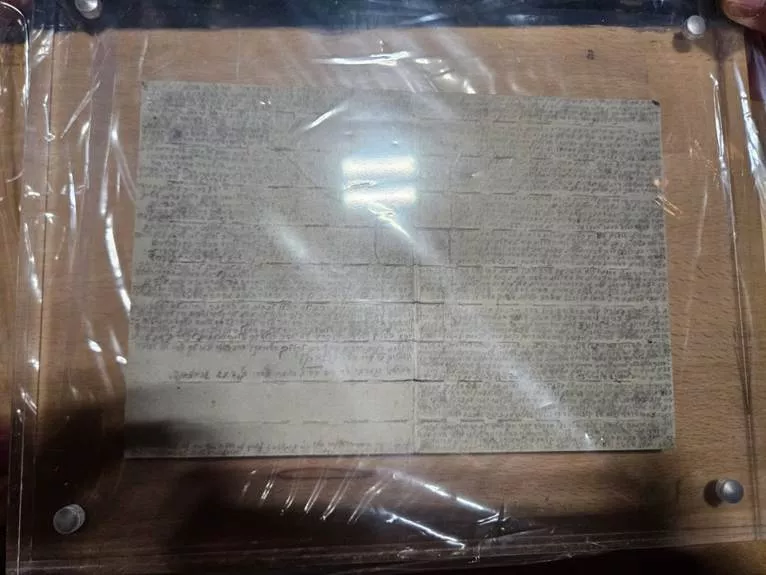Pages of Love
A Book of Song of Songs was discovered 83 years after it was written under the eyes of the Nazi oppressors.
By: Yaakov Rosenfeld, Ganzach Kiddush Hashem
Chaim Avraham Fried, a soldier in the Hungarian army, was imprisoned in a German military prison after the British succeeded in carrying out a daring and deadly act of sabotage in the ranks of the German army.
The Germans were unable to discover the identity of the perpetrator of the act of sabotage, and therefore launched disproportionate acts of revenge against anyone who fell into their hands.

Jews visit relatives in prison in the Kovno Ghetto
Chaim Avraham, a young Jew, was captured at that very moment, and according to the course of nature, based on the situation that prevailed at the time, he had already been sentenced to death. The prosecution provided him with a lawyer, and he made Chaim Avraham understand that there was not much that could be done. More precisely: there was no chance, given the facts, that the punishment would be lighter than death, the only question was when and in what form.
Chaim Avraham sat alone in his cell and prepared for his death.
The hours, as he described in his later years, seemed like long years to him. He sat idly for days and nights and felt that his mind was about to be devoured. So, what does a young Jewish man sentenced to death do during such long and terrible days?
Chaim Avraham began to conduct a kind of dialogue between his yetzer hatov (good inclination) and his yetzer hara (negative inclination). Day and night, he would speak aloud the words of the yetzer hara, its temptations, arguments, persuasions, and its despairing logic, such as: What good is it for you now to serve G-d, pray, and study, when they are going to kill you and no one will ever know about you? Then he would begin to detail the words of the yetzer hatov. He would break down the logical arguments of the yetzer hara and explain with good taste and knowledge why even in this situation, precisely in the Valley of the Shadow of Death, he should not despair, and he should not let go of faith, trust, joy, the worship of God, and the study of Torah.
Thus the yetzer hatov and the yetzer hara would argue with each other all hours of the day and large parts of the night, and Chaim Avraham did not know that behind a thin wall a person was sitting and listening to him, and also understanding.
This man was a gentile prisoner of war, who had been sentenced to death, and he would hear, and understand, the Jewish words of Chaim Avraham, who was doing his own cheshbon nefesh (spiritual soul accounting) there next to him, in the Valley of Tears, a place from which no one had ever emerged alive.
One day when the two met on their way to the bathroom stall, the gentile asked Chaim Avraham: Who are you talking to there all the time? I’m talking to myself, Chaim Avraham replied, and tried to evade the question.
The gentile said to him: Know that I understand Yiddish! Until the war, in the good old days, I lived next door to chassidic Jews and a revered Jewish rabbi, and I became friends with them from a young age. They would call me to serve as a “Shabbos goy” whenever they needed it, and over the years I have absorbed their words, customs and language, and I can tell you that I understand every word you speak there, as if to yourself.
Chaim Avraham no longer saw any point in evading and explained to the man the course of events; how he was spending his time during the long days and how he intended to continue doing so in the near future, as long as God would grant him the gift of life.
The gentile thought for a moment, and said to Chaim Avraham: “My death sentence is set for tomorrow, and therefore I no longer see any reason to keep the papers for myself. Therefore, in the evening I will pass the papers to you through a small hole that opened in the thin wall that connects our cells.” Chaim Avraham did not understand what paper was in question, but the gentile, excited and agitated, spared him questions and explained himself.
“On the day of the brutal deportation, I left my home and watched as the Jewish community I loved so much was being violently expelled. I saw the revered rabbi of the community leave his home, a siddur (prayerbook) in his lap and tears in his eyes. The wicked ones ripped the siddur from his hand, tore it to shreds, and sent the rabbi wherever they sent him. I hurried and picked up a few papers from those scattered across the ground, and took them with me to serve as ‘protection’ for the difficult times ahead.”
“I keep these papers with me at all times, and I see now that the time has come, and any ‘protection’ will no longer be of any use to me.”
“In the evening I will hand you the pages, and you can do with them as you see fit.”
“I will hand them to you in the evening, the gentile concluded, and you, please, open them only in the morning, when I will already be ‘not here.'”
Chaim Avraham opened the pages in the morning and his heart was full of excitement. He found in them what his soul loves: the chapter “Give thanks to G-d, for He is good, His kindness endures forever” – which is said every Shabbat evening before the Mincha prayers, and on the other side, and also on the additional page, was the Book of Song of Songs! It is also said every Shabbat evening in the Diaspora.
Chaim Avraham experienced such a strong joy at the recitation of these beloved lines that it is difficult to describe in words what he felt at that time. Song of Songs! Praise be to G-d!
First he recited the chapter with excitement and tears, and then he thought of an idea to dispel the boredom that had befallen him. The opportunity was not long in coming, when one of those days a chaplain entered his cell and asked him if he needed anything.
Chaim Avraham asked for a page and a pen, and the chaplain entered after a while, with a printed chessboard and a pen.
Chaim Avraham turned the chessboard over and wrote from memory the entire Book of Song of Songs. His intention was to test himself whether he still remembered the entire book, which is not that short, as we know. Now that he had the page, he had somewhere to glance from time to time to see if he was making a mistake or not… thank G-d, he did not make any mistakes. Chaim Avraham managed to copy the entire Book of Song of Songs from memory, and when he compared the two pages – his chessboard and the torn page from the Rabbi’s siddur, may G-d avenge his blood – he couldn’t be happier to discover: thank G-d, his head was working well, there wasn’t even a single mistake!…
Not long after, the trial day arrived. The one Jew stood before a group of harsh judges and was asked to explain his arguments. Chaim Avraham did not have too many chances of finding favour in the eyes of the wicked. He trusted in G-d, and so he stood in the military court, “his eyes upward and his heart downward,” as the sages said, and in his pocket, the Song of Songs from a torn siddur that belonged to the holy ones in the earth, and another Song of Songs, the glorious work of his hands, the fruit of his memory that did not betray him.
Chaim Avraham, who was endowed with an extraordinary memory, later said that a moment after he finished his words in court, they faded from his memory, and he had no idea what he had said. All these years he tried to reconstruct what came out of his mouth at that fateful hour, and until his last day he simply did not know! He only remembered that the judge was very moved by the words, and sentenced him, against all odds, to life.
Simply, to life.
A Jew, a soldier, a prisoner, and the year is 1942, the height of the war, and the German judge decides to grant him life.
Chaim Avraham knew all his life that his story had no other interpretation other than it being a “miracle.”
Chaim Avraham was saved from hell, immigrated to the United States, raised a beautiful family, and lived in Monsey. He was known as a pure-hearted and upright man, a learned scholar, and had a strong memory. He recounted memories from times gone by with amazing accuracy, and everyone was amazed by his rare memory.
Thirty years ago, when he prayed at the Koson chassidic Beit Midrash (study hall) in the Forshay-Monsey neighborhood of New York, he told this story to the community rabbi, an important and influential Rebbe, who heard, was moved, but, as is the custom of the world, forgot.
Last week, as part of the classes that the Koson Rebbe gives in Forshay, on matters regarding Shabbat, the rabbi intended to speak about the Song of Songs, which is recited on the eve of Shabbat, and suddenly, while the rabbi was searching for interesting and appealing material, this story popped into his memory.

The Koson-Forshay Rebbe
He quickly got in touch with the son of Chaim Avraham, the chassid, Rabbi Mordechai Ozer Fried, and asked him if he remembered this story.
“Of course I remember,” said Mordechai Ozer excitedly. “This page is with me, it was inherited by me, and in my eyes it is worth a great fortune. I cannot give up this page, which symbolizes in my eyes my father’s self-sacrifice, and his pure and innocent heart, his faith in G-d in the Valley of the Shadow of Death, and his wonderful miracle of salvation. For G-d commanded His angels to guard my father in those difficult days. This page, the chessboard, always brings me back to the image of my father, the good and pleasant Jew who was always happy, and who was able to rebuild the ruins of his life.”
That same day, Friday night, the 14th of Av, 5785, Mordechai Ozer Fried arrived at the Forshay Beit Midrash in Monsey and presented the rabbi with a photocopy of this Song of Songs: a large piece of paper covered with a thick layer of strong glass.
The rabbi was very excited and in the lesson, he recounted this entire event to the participants, however, the bigger surprise came at the end. When the rabbi finished the story and quoted from the photo what Chaim Avraham wrote at the end of his manuscript:
I started and finished, thank G-d, here in a military prison on 7/28/42 (Av 14, 5702).

Charedi (Ultra-Orthodox) Monsey
The Koson-Forshay Rebbe rubbed his eyes in astonishment. He asks those around him to check the matter and it turns out that it was the same day. On Friday night, the 14th of Av, 5785, the Rabbi of the community for some reason remembered a story he heard thirty years ago, and suddenly it turns out that this story took place exactly eighty-three years ago, today, the 14th of Av, 5702…
On that day Rabbi Chaim Avraham began writing, and on the same day he finished. Here is a picture of the Song of Songs on the other side of a chessboard, written in holiness and purity, from the rising heart of a warm and ardent Jew, who did not lose his faith in G-d under any circumstances, and was blessed to be saved from the Valley of Destruction and to establish a beautiful and large family in G-d’s honour and glory.















